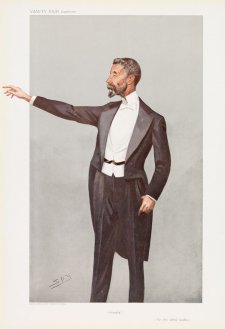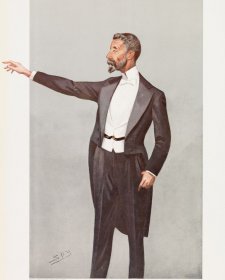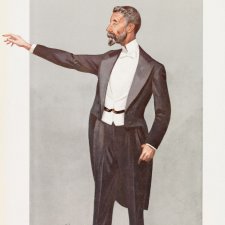- About us
- Support the Gallery
- Venue hire
- Publications
- Research library
- Organisation chart
- Employment
- Contact us
- Make a booking
- Onsite programs
- Online programs
- School visit information
- Learning resources
- Little Darlings
- Professional learning
Sir Edmund Barton GCMG KC PC (1849-1920), Australia’s first prime minister, was the youngest of nine children of a well-educated woman. Captain of Sydney Grammar two years running and an outstanding student of classics at the University of Sydney, he worked as a solicitor and barrister for ten years before being elected to the New South Wales Legislative Assembly in 1879. Over the next twenty years he represented four different seats, becoming speaker and attorney general in turn. Through the mid-1890s Barton was the prime mover for the federation of the Australian colonies into one Commonwealth, passionately explaining and promoting the process to the people and later, in 1900, to the British parliament. He became prime minister in 1901. During his single term in office, the Immigration Restriction Act passed, the first Australian soldiers went to the Boer War, Edward VII succeeded Queen Victoria and the High Court was established. On the way home from representing Australia at the Colonial Conference of British Empire prime ministers in 1902, he met the Pope and conversed with him in Latin - to the horror of Australian protestants. He gained honorary doctorates from Cambridge and Oxford and honorary memberships of twelve London clubs. Barton resigned from politics in 1903, to spend the rest of his life as a judge on the High Court.
Sir Leslie Ward, who signed his work ‘Spy’, was the most famous of the caricaturists who worked for the English magazine Vanity Fair, published weekly between 1868 and 1914.
Gift of Mr Ronald Walker 2001
Sir Leslie Ward (age 51 in 1902)
The Rt. Hon Sir Edmund Barton GCMG PC KC (age 53 in 1902)
Ronald Walker (23 portraits)



On one level The Companion talks about the most famous and frontline Australians, but on another it tells us about ourselves.



Ashleigh Wadman rediscovers the Australian characters represented with a kindly touch by the British portrait artist Leslie Ward for the society magazine Vanity Fair.



Visit us, learn with us, support us or work with us! Here’s a range of information about planning your visit, our history and more!